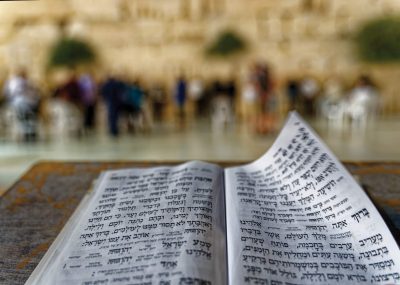
by: Terry Mason, Director of International Development
 Do you have any habits or spiritual disciplines that you have maintained over many years in your life? My spiritual life has been greatly deepened and enriched by studying the weekly Torah (Gen.–Deut.) portion (Parashat HaShavua). Each year, the worldwide Jewish community reads through the first five books of the Bible—the Pentateuch—together. Every week, they read on average three to five chapters. To learn more about the weekly Torah portion and its history, see an article entitled “Unpacking the Parashah” I wrote in the April 2020 issue of the Dispatch from Jerusalem.
Do you have any habits or spiritual disciplines that you have maintained over many years in your life? My spiritual life has been greatly deepened and enriched by studying the weekly Torah (Gen.–Deut.) portion (Parashat HaShavua). Each year, the worldwide Jewish community reads through the first five books of the Bible—the Pentateuch—together. Every week, they read on average three to five chapters. To learn more about the weekly Torah portion and its history, see an article entitled “Unpacking the Parashah” I wrote in the April 2020 issue of the Dispatch from Jerusalem.
Long before moving to Israel nine and a half years ago, my wife Robbie and I started the practice of looking deeply into the weekly portion. But studying alongside the Jewish community here in the Land has added an entirely new dimension.
Observant Jewish people are deeply steeped in the Torah and study the portion for each week closely. The Torah is said to be like a diamond: turn it slowly in the light and ever new insights will be found. In fact, it is common here in Israel to hear ordinary people discussing the weekly Torah portion wherever you go. For instance, I was recently at a baby naming ceremony talking with several young Orthodox Jewish men. One of them brought up a question he had been trying to solve from that week’s portion. A lively, 10-minute discussion ensued in which we all joined in with our own understanding and ideas.
 Drinking from the Well
Drinking from the WellIn Israel—and especially here in Jerusalem—a plethora of resources are available to help one study the weekly Torah portion. Many rabbis—both ancient and modern—have written insights that they have gleaned over the years from their study of the weekly portion in the original Hebrew.
Each year, Robbie and I try to purchase a different volume or set of volumes by different Torah scholars to read their commentary along with the weekly chapters. Some choose to write about a universal subject within the portions, such as leadership principles or how the portion relates to the Land of Israel, for instance. Some bring out the lesser known—but often profound—insights of Jewish sages from past centuries. And it is common to close with a life application for today, which helps us to better live out our faith as God intends.
There are also many opportunities to hear gifted Jewish teachers expound in person on the weekly Torah portion. I often tell people that one of the challenges of living in Jerusalem is how to structure our time. We could literally be out every night of the week learning with gifted teachers, but there is only so much that one can absorb and put into practice.
Another blessing of living in Israel and studying the Torah portion here is what I call unity within diversity. As God predicted in His word, the Jewish people have returned home from all over the world after being in exile for almost 2,000 years. There is a degree of unity in living among a Jewish majority who study the same Torah portion and honor the biblical festivals together. And yet, there is immense diversity in how they pray and practice their faith. Here in Israel, we are able to experience a wide range of Jewish life when it comes to prayer in the synagogue, practice in the homes and so forth. While the commentaries of some Jewish sages are accepted and followed by nearly all Jewish communities, each stream of Judaism also has voices and writers that are unique. Jewish people from North Africa, for instance, can have very different views than Jewish communities that developed in Eastern Europe. And yet despite these diversities, all of them focus their lives around the same Torah, annual festival cycle and core values.
 Digging Deeper
Digging DeeperOne of those core values is learning and asking insightful questions. You can be sure that within the Jewish community, whether in Cape Town, Melbourne or any other place in the world, everyone is studying the weekly Torah portion. And, if prompted by someone with a true learner’s heart, they will probably be happy to share what they are currently learning or how they have seen a principle from the weekly portion lived out in the past. Proverbs 27:17 comes to mind, teaching “As iron sharpens iron, so one person sharpens another” (NASB). Discussing opinions about the biblical text helps everyone to further clarify their own understanding. In fact, it is the most Jewish or Hebraic thing in the world to ask questions. Next time you read through the Gospel narratives, notice how often Jesus (Yeshua) answers questions with questions. Already at 12 years old, he stayed behind in Jerusalem, much to the consternation of his parents. And where did they eventually find him? Luke 2:46 says, “Then, after three days they found Him in the temple, sitting in the midst of the teachers, both listening to them and asking them questions” (NASB).
I encourage you to make reading and studying the Bible a regular discipline in your own life. It will enrich your walk with the Lord. You may even want to try studying with someone else who can ask you questions and share additional insights. Then come to visit Jerusalem and study the Bible in its original setting for yourself. There truly is nothing like it!
Photo Credit: Click on photo to see photo credit
All logos and trademarks in this site are property of their respective owner. All other materials are property of Bridges for Peace. Copyright © 2025.
Website Site Design by J-Town Internet Services Ltd. - Based in Jerusalem and Serving the World.